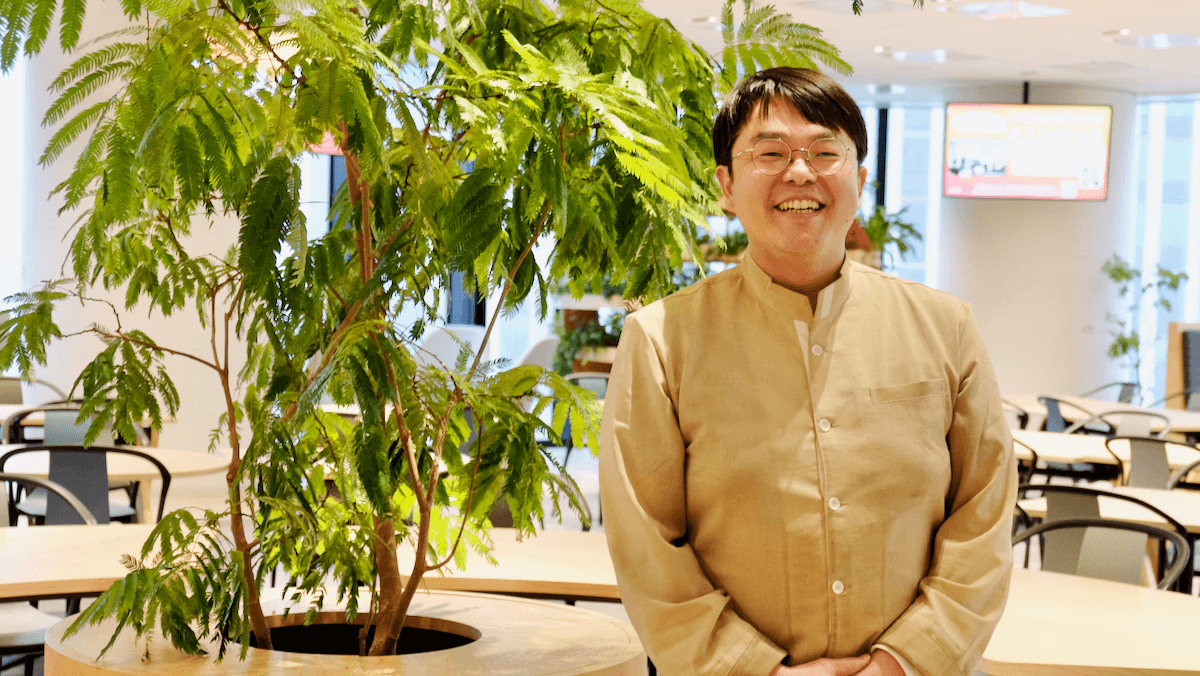こんにちは。
神奈川県の山奥の古民家で、ほぼエアコンなしの生活を送っているライターの平川です。
風通しがよくて涼しいはずの古民家も、35℃がデフォルトの日々は想定外。秋の到来を早くも待ち侘びている今日この頃です。
今回ご紹介するのは、2023年にモノサスに入社しMONOSUS社食研に所属する岡竹義弘さん。現在、イギリス大手製薬会社のオフィス内で運営している社員食堂の料理長を務めています。ニコニコと温和な笑顔が印象的な岡竹さんが目指すのは「毎日でも食べたくなる料理」。食の仕事の喜びとやりがい、そして責任を噛み締めながら充実した日々を過ごす岡竹さんに、これまでの道のりと社食に感じた可能性について伺いました。
ミュージシャンから料理の道へ
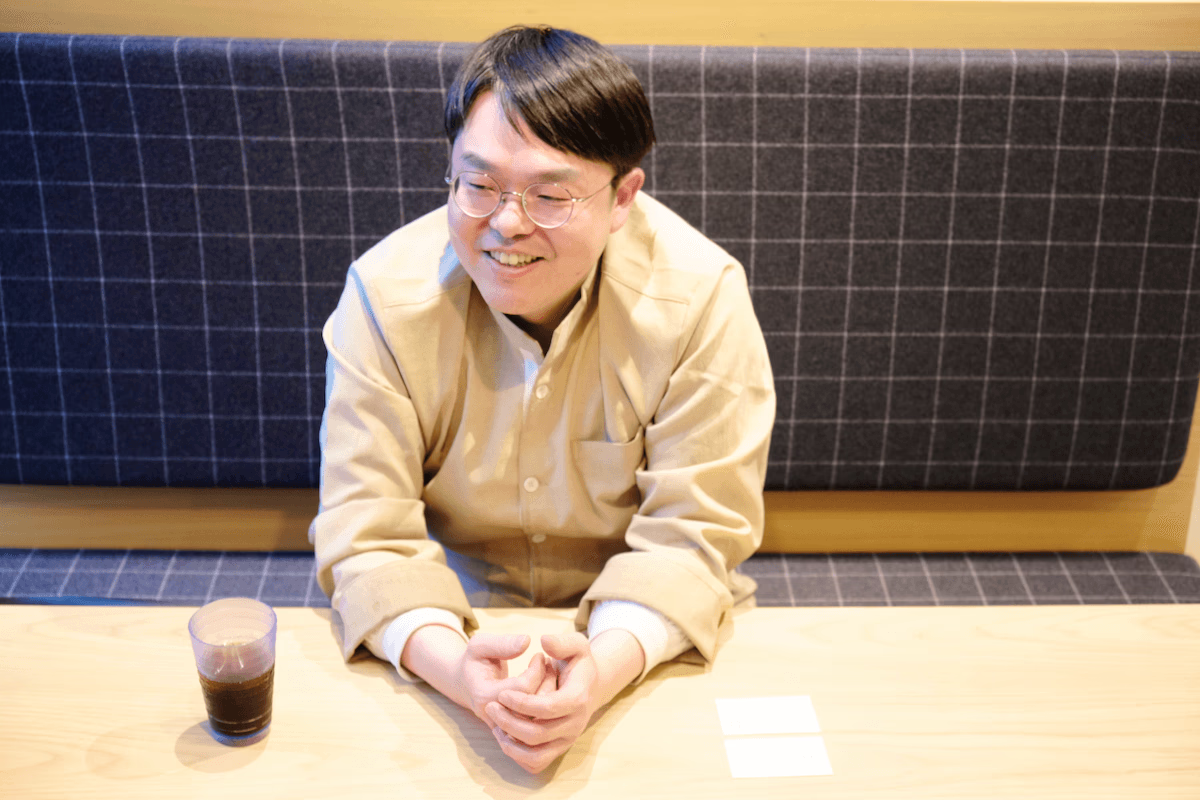
平川 もともとミュージシャンだったと伺いました。
岡竹 20代半ばまで、バンドでドラムをやっていました。ただ、バンドだけでは食べれなかったので、アルバイトもしていたんですね。その中で飲食のアルバイトがいちばん楽しかったんです。やっぱりものをつくる仕事って面白い。だからバンドが解散して音楽活動に区切りをつけようと思ったとき、今後の生活の糧として選択する仕事は、料理がいいなと思いました。
平川 これまで、どんなお店で働かれてきたんですか。
岡竹 僕はおしゃれなフレンチやイタリアンよりも、日常的に食べるご飯やお味噌汁が好きだったので、アルバイト時代から、自分が毎日でも食べたいと思える定食屋や和食のお店で働いてきました。バンドを辞めたあとに働いたのは、鎌倉にある「なると屋+典座」。鎌倉野菜を中心とした和食をお膳で出す料理屋さんです。ずっと洗い物と野菜の下処理などを任されていました。その合間にどんなふうに料理をつくっているかを見て、賄いを食べ、毎日メモをとっていたんですね。
仕事自体は面白かったんですけど、料理のことをもっと知りたい、次のステップに進みたいという思いもあって、3年ほどで辞めました。次にお世話になったのが「D&DEPARTMENT」がやっている渋谷ヒカリエの「d47食堂」です。そこも定食屋さんで、日本各地の郷土料理や土地に根付いた食材を使った料理をお膳で出していました。
平川 ハレの日のごはんよりケの日のごはんをつくりたいんですね。「d47食堂」に入るきっかけは何かあったんですか。
岡竹 2014年ごろだったと思うのですが、「d47食堂」の横のミュージアムで、山形県の企画展をやっていたんです。その企画展と連動して、食堂では山形の郷土料理を出していました。それが、ものすごくおいしかったんですね。郷土料理を受け継ぎながらもちゃんとおいしくて、しかも、見栄えや味だけじゃなく「もっと大切なものってあるよね」みたいな思いが感じられて。すぐに面接をお願いして「すごくおいしかったので一緒に働きたい」と言ったら採用され、8年ぐらい料理人として働きました。
「d47食堂」では、ただ郷土料理を再現するだけでなく、現地に足を運んで地元のお母さんに郷土料理について聞き、食べさせてもらい、つくり方を教わってお店で出していました。各地の郷土料理や食材が勉強できる上にいろいろな人に伝えられる仕事はすごく面白かったし、自分の好きな「日常食」という料理の文脈ともつながるところがありました。
生産者との持続可能な関係性を模索し、モノサスへ
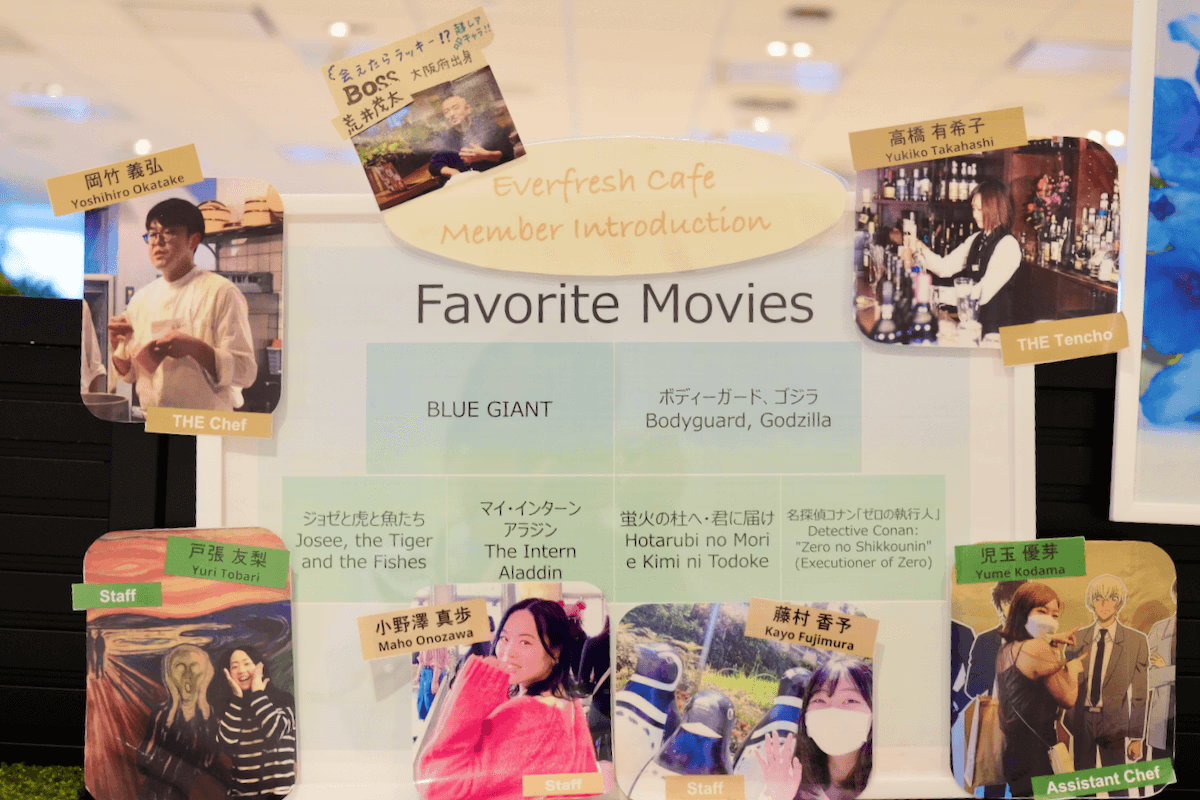
平川 聞いていると「d47食堂」の仕事は岡竹さんにぴったりだった気がします。モノサスに移ってこられたのはなぜだったんですか。
岡竹 きっかけのひとつは、コロナ禍ですね。お客さんが来なくなり、2年ぐらいは明日もわからない生活が続きました。その間もいろいろな生産者さんとやり取りしていたのですが、みなさん大変なはずなのに、こちらのことをすごく気遣ってくださるんですね。でも自分たちはその気持ちに応えられない。料理をつくって食べてもらうという前提があってこそ、届けてもらえる食材があったことを痛感しましたし、大きな挫折感を味わいました。
そこで、同じ食の仕事でも、例えば加工品をつくって直接家庭に届けるなど、レストランとは違うことをやってみたいと思って辞めたんですね。そんなとき、たまたま「日本仕事百貨」を見ていたら、MONOSUS社食研が運営する「九段食堂」の求人記事を見つけました。しかも募集しているのは料理人ではなく店舗責任者。料理人とは違うことをやりたいと考えていたから興味が湧いて、ダメもとで応募してみました。
平川 「社食」については、何か惹かれるものがあったんですか。
岡竹 すごく惹かれました。社食って、全社員のうちの何割が利用して、コンスタントに毎日何食出ていくといったコントロールがしやすいんですね。そうすると生産者に対しても、毎月これくらいの量が使えるから、このぐらい生産してほしいといったやり取りがすごくしやすい。生産者さんも確実な取引先があれば安心して生産することができます。そういう仕組みは街場のレストランだと難しいから、関係性としてすごくいいなと思って。
もちろん、またコロナ禍みたいなことが起きたら、社食だって閉めることはあると思うんです。でもモノサスは、自分たちで食品加工もやっています。だから万が一社食を閉めることになっても、モノサスなら別の可能性もあるんじゃないかと感じました。
1日3食のうちの1食を預かる責任とやりがい
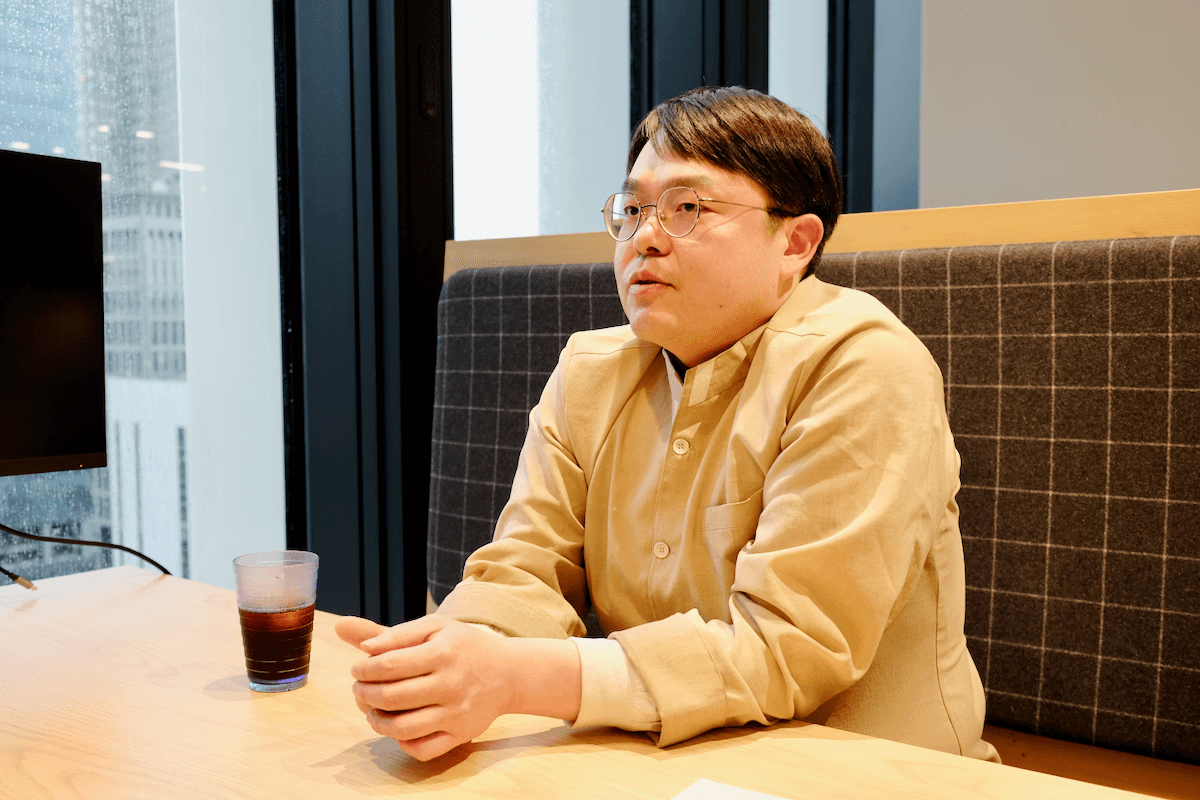
平川 店舗責任者の仕事はどうでしたか?
岡竹 大変でしたね。料理人としてのスキルや厨房でのマネジメント力が、店舗責任者のマネジメント力とはイコールにならないことがすごく多かったです。料理人をサポートしつつ、お店全体をうまく回すことを円滑にやるスキルが、僕には正直ありませんでした。すごく悩んでいましたね。それが今の社員食堂に来るまでの9ヶ月間ぐらいかな。
平川 だいぶ悩みましたね。
岡竹 その間ずっともがいていたような感じです。そうしたら事業責任者の荒井さんが「別の社員食堂の厨房でシェフをやらない?」と持ちかけてくれたんです。僕もこのまま悩んでいるよりは新しいところで料理をやり直すのもいいかなと思って引き受けました。ブランクがあったから最初は大変だったんですけどね。日々の仕込みも料理の味付けも不安でしたし。でも、僕がつくるようになってしばらくして、ここの社員のみなさんから「料理がおいしくなった」と言ってもらえるようになりました。
それで気づいたんですけど、僕は自分が料理したものを毎日食べてくれる人たちがいることが、すごく嬉しかったんですよね。社食だから、毎日ランチを食べに来てくれる方たちがたくさんいる。それってすごいことだなと思って。1日3食のうちの1食を預かるって、家族にご飯をつくるのと同じようなもので、すごく重要じゃないですか。これは、街場のレストランでは味わえない感覚なんです。
平川 確かに、いくら好きなレストランでも毎日は行かないですもんね。
ランチ数が、1日150食→250食に!
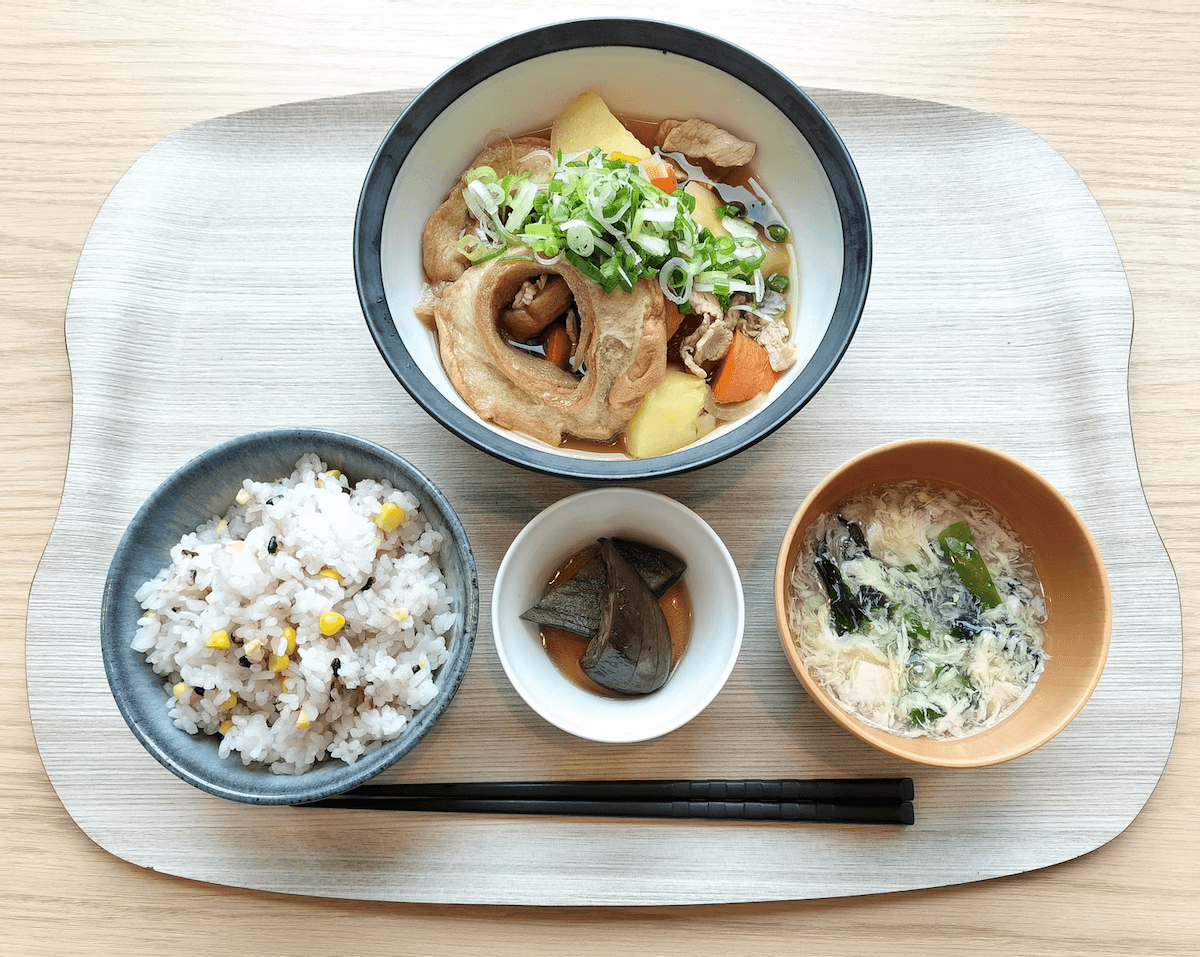
車麩の肉じゃが定食(とうもろこしと黒米のご飯、茄子のオランダ煮、かきたま汁)
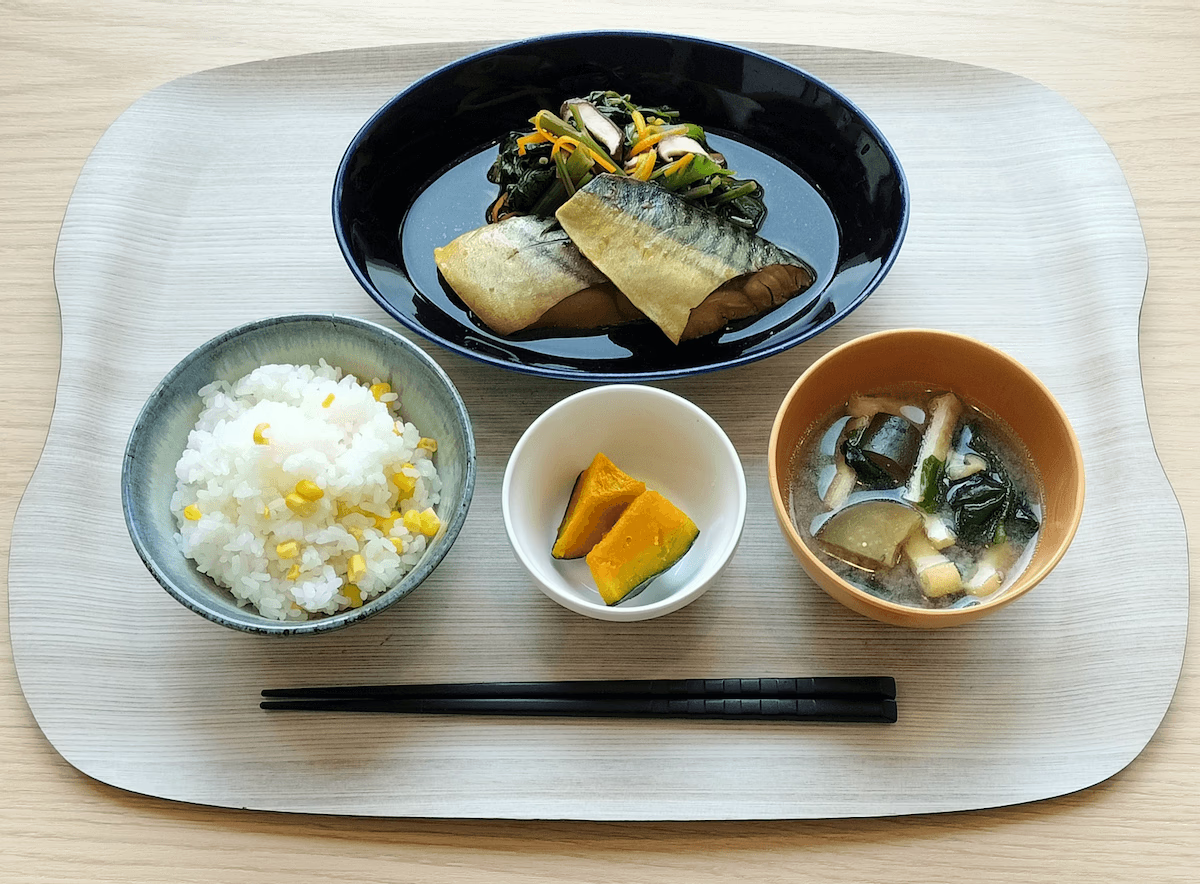
さばの煮つけ定食(ツルムラサキと空芯菜のお浸し、とうもろこしご飯、 蒸しかぼちゃ、茄子のお味噌汁)
平川 ちなみにどんなメニューを出しているんですか。
岡竹 今日はハンバーグと冷やし担々麺とカレー。定食メニューと麺メニューとカレーライス、あとは週替わりのサラダボウルがあって、だいたい4つのラインナップでやっています。でも僕は和食が好きだから、ハンバーグはどちらかというと苦手なメニューです(笑)。だから和食が多めにはなるんですけど、全体のバランスも考えないといけないので、洋食や中華も出しています。
ただ、僕はやっぱり和食が好きなので(笑)。麺メニューもパスタばかりだったのを、ちょっとずつそばやうどんを入れていきました。定食も、味噌漬け焼きとか味噌煮みたいな魚メニューをじわじわ増やしていって。魚料理が嬉しいっていうお声もいただいてますし、なによりお味噌汁がすごくおいしくなったと言われたのが嬉しかったですね。
平川 お味噌汁は、やはり出汁からとってるんですか。
岡竹 昆布やかつおだけで出汁をとると手間もコストもかかるので、僕は仕込みのときに出る野菜の端材を使ってお味噌汁をつくっています。野菜っていい出汁が出るんですよ。いろいろな人から「お味噌汁がおいしくなった」って言われました。だんだん社食の利用者も増えてきて、もともと1日150食ぐらいだったのが、僕が入ってから250食まで増えたんです。
平川 えーそれはすごい!
岡竹 今まで培ってきたことは間違ってなかったんだと、再確認しました。いろいろあったけど、あらためて料理にやりがいを得た。最近は、周りの信頼も得られるようになってきているので、本当に自分がやりたかったことにも、ちょっとずつ取り組める気がしています。
当たり前のおいしさを突き詰めていく
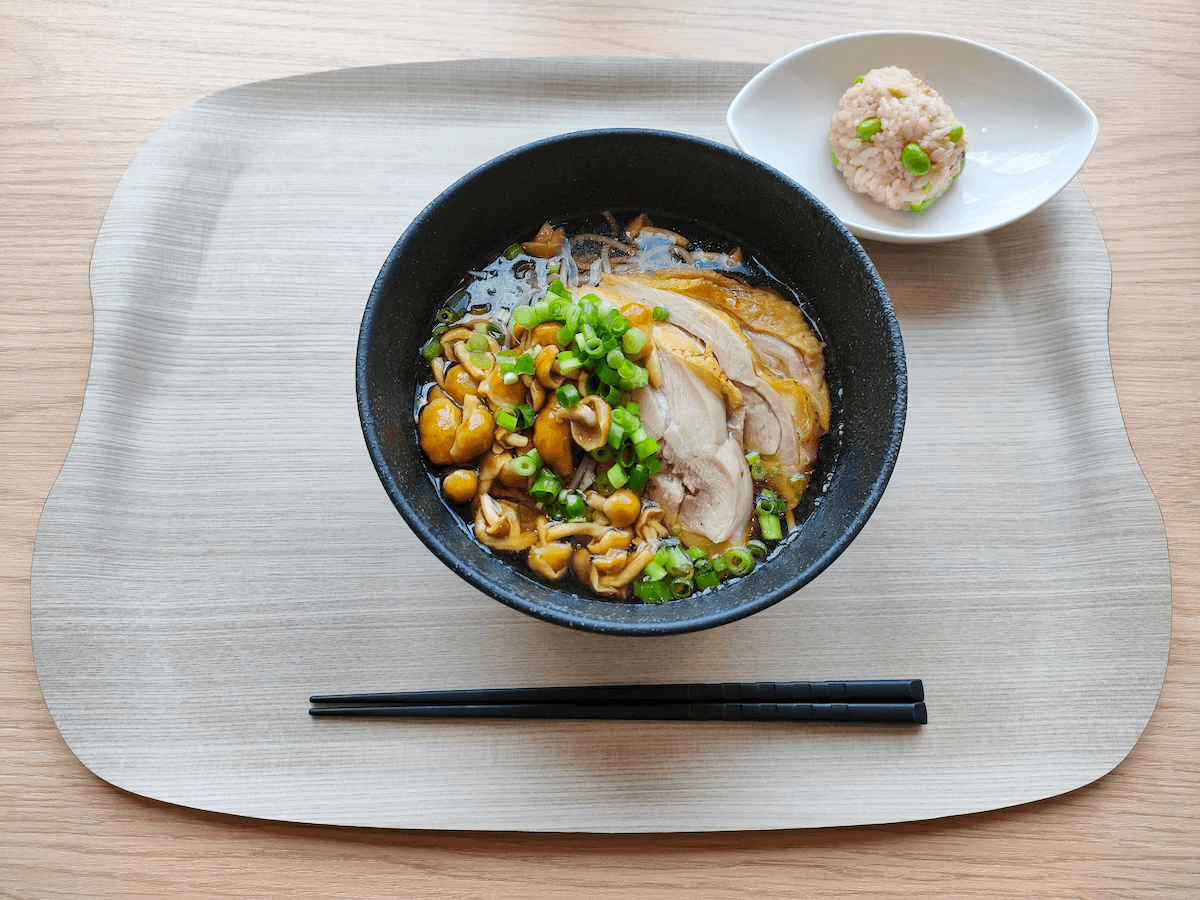
鶏肉となめこの冷やしそば、枝豆のおむすび。
平川 本当にやりたかったことというのは?
岡竹 今も小さい生産者さんとのやり取りをしていますが、使いたいけど使えていない食材が、まだたくさんあるんです。そういう食材の提案がどんどんできるようになったらいいなと。そうすれば、生産者の後押しになる。例えば、瀬戸内のいりこをつくっている人たちが香川にいて、すごくおいしいんです。でもここでは使えていないのでいずれ使えるようにしていけたらなと。
平川 d47食堂時代から一貫して、岡竹さんにとって、生産者とのつながりや関係性をいかに築き、続けていくかということが大切なんですね。
岡竹 そうかもしれません。あともうひとつは、やっぱり毎日の食事なので、そこを裏切るようなことはしたくない。おいしくて健康的なものを淡々とつくり続けたいですね。まぁ、それが難しいんですけどね。同じメニューでも「すごくおいしかった」と言う方もいれば、「今日の味付けはすごく甘かった」と言う方もいる。その差って何だろうと思うと、かけたタレの量が多かったのかもしれないし、性別や出身地の違いで味の好みが違うということなのかもしれない。それらをすり合わせたあとに残る、本当においしい部分って何だろうということはよく考えています。そういう当たり前のおいしさを突き詰めていくことは、やりたいことでもあるし、やってることでもあるし、続けていきたいことでもあります。
平川 すごく地道な作業ですね。
岡竹 でもそれでいいんですよ。僕は何かを表現するような自分の料理をつくりたい人じゃない。一杯のご飯とお味噌汁でほっとひと息ついてもらい、午後も仕事を頑張ろうという活力になってくれればそれでいいと思っているんです。
杉本(ライター) 岡竹さんってもともとドラマーでリズムを刻む方じゃないですか。こじつけかもしれないけど、岡竹さんのご飯って日々のリズムみたいですね。
岡竹 それはあるかもしれないですね(笑)。やっぱり僕は、一歩引いてるんですよね。下支えでいいという性格に、社食の仕事は合っているのかもしれないです。
「最近、すごく楽しそうに仕事してるんですよ」という噂どおり、とてもいきいきと楽しそうだった岡竹さん。得意料理は煮物。出汁が大好き。肉より魚。和食を愛するその姿は、まるで栄養バランスをしっかり考え、社員の健康を見守る「お母さん」のよう。社食なので、なかなか私たちがいただく機会はなさそうですが、いつか岡竹さんのつくるしみじみおいしい「ケの日のご飯」が食べてみたいです。
